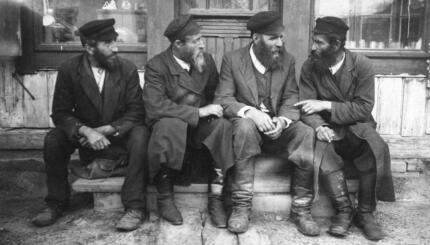I am a rabbi. I am 46 years old. I am also the granddaughter and grand-niece of Germans who were and are not Jewish. What that means is that my grandfather and my great-uncles were in the German army during WWII, during the Holocaust. As far as I know, no one in my family was a member of the Nazi party, but neither were they resisters—they were not “righteous Gentiles.” I don’t talk about this much, but I spent many years feeling guilt and shame about my heritage, and when I converted to Judaism, it added a whole new dimension that I had to figure out. My conversion to Judaism, and my family of origin, placed me on both sides of the Holocaust.
Ten years ago I went on a trip for rabbis to Berlin. I’d been to Germany many times to visit family, but this was my first trip there as a Jewish professional. One evening we met with an Israeli diplomat. Among other points that he made, he said that after the Holocaust, Jews and Germans both said, “Never again,” but the phrase had a different meaning for each group. Jews meant: “Never again will we allow ourselves to be slaughtered.” Germans meant: “Never again will we stand by while innocent people are murdered.”
I have known for many years about the baggage of shame I carry as the granddaughter and grand-niece of Germans who served in the army on Hitler’s side, and of those who stood by and did not resist. But since the presidential election, that baggage has presented itself to me in a different and new way.
There are those who, since the election of Donald Trump, have said, “Wait and see. Listen. Don’t act yet.” I have a very strong visceral reaction to this, that this is a time when we cannot afford to wait and see, that we must protest and intervene before it’s too late. My grandmother in Germany once told me that after Hitler was appointed Chancellor, her father came home and said, “We’ve made a terrible mistake.” Of course, history has shown that he was exactly right, but it seems it was already too late.
For many years I have said that had I been in the situation that my grandparents were in—he drafted into the army, she at home, struggling to survive with three very small children (the oldest was my mother, born in 1939)—I do not know what I would have done. I do not know if I would have been brave enough to resist. That is painful, but I did not really believe I would ever truly be tested.
Since November 8, I believe that test may come, and it is terrifying. Because of my emotional baggage, I feel compelled to act, to not repeat what my grandparents did and did not do. Never again will my family stand by while innocent people are murdered.
I speak about social issues from the pulpit. I have spoken against the police shootings of unarmed black men, against domestic violence, for LGBTIQ rights, for women’s rights. I have written about these issues. But social activism in the form of protests, community organizing, and even letters and phone calls, does not come naturally to me. I am pushing myself. I’ve written to our president, to members of Congress, to the governor of North Dakota, multiple times in recent weeks. I’ve made phone calls. I will push myself to do more.
It may be that the parallels I see are not actually parallels, that the current situation will not play out in disaster. God knows I pray that is the case. But I don’t feel that I can take that chance. I need to join those making a strong stand against anti-Islam, anti-immigrant, misogynist, racist, antisemitic, and homophobic rhetoric and actions. I need to act, and not wait, in part because I believe it’s the right thing to do, and in part to atone for my family. May the best that is in each of us prevail.


